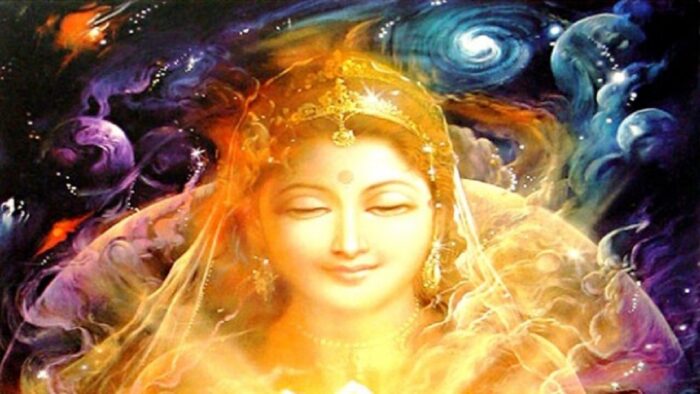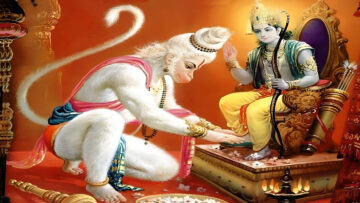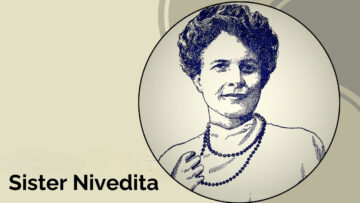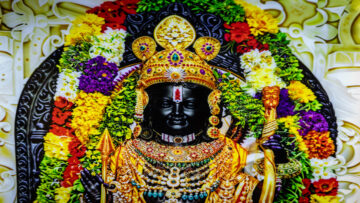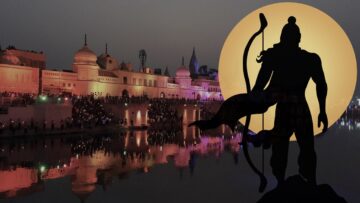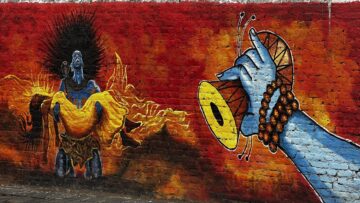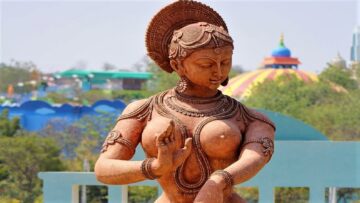The Apsarās of Amaravati, manifested themselves in many roles. Cherishing each of these roles and leaving soft footprints on the rich sheets of Puranic scriptures, these Apsarās became an essential part of the timeless Sanatan tales. The adventures of Apsarā Rambhā have been many, elevating her as one of the most prominent Apsarās of the Hindu scriptures. Apsarā Rambhā once played the role of a successful emissary to Lord Shiva and Devi Parvati’s daughter. Once she became an efficacious ploy of Indra who implemented her skills to destroy the mighty demon Vṛtrasura.
Rambhā As A Love Messenger
Once while touring the Nandanvan, Devi Parvati reached the Kalpavriksha-the wish fulfilling tree. To drive away her loneliness, Devi Parvati desired for a daughter from the tree. The Kalpavriksha fulfilled Devi Parvati’s wish and granted her a daughter who was named Aśokasundarī. After being blessed with a daughter, Devi Parvati prophesied Aśokasundar’s marriage to Nahuṣa of the Lunar Dynasty.
The beautiful daughter of Shiva and Parvati, Aśokasundarī was once taking a stroll inside the beautiful Nandanvana, when Huṇḍa, a demon sees her, he instantly falls in love with her. Ashokasundari ignores Huṇḍa’s advances and informs him that she was to marry Āyu’s son, Nahuṣa. After listening to Aśokasundarī’s revelation, Huṇḍa hatches a plan. Disguised as a widow he visits Aśokasundarī and asks her to accompany him to the hermitage. Convinced by Huṇḍa’s camouflaged widowed attire and gestures, Aśokasundarī follows the disguised demon to his palace. Upon reaching the palace, Aśokasundarī realises that she had been tricked by Huṇḍa’s treachery. Angered by his act, Aśokasundarī curses Huṇḍa to be killed by Nahuṣa. She escapes from the clutches of Huṇḍa to Mount Kailash.
Agitated by Aśokasundarī’s curse, Huṇḍa abducts Nahuṣa from his palace. Huṇḍa fails to execute his evil intent on Nahuṣa as he is rescued by one of Huṇḍa’s maid, who leaves Nahuṣa with Maharishi Vashistha. Nahuṣa is nurtured and cared for by Maharishi Vashistha. Nahuṣa grows up and realizes his destiny as the slayer of Rakshasa Huṇḍa. In the meantime, Huṇḍa makes Aśokasundarī his hostage and falsely informs her that he had killed Nahuṣa. Aśokasundarī is sad and broken. It is then that she comes across a Kinnara couple who inform her of Nahuṣa’s well-being and foretell her that she would mother a powerful son called Yayati and a hundred beautiful daughters after her marriage to Nahuṣa.
After listening to the prophecy made by the Kinnar couple, Aśokasundarī settles down in deep penance. Once she rises from her penance, she meets Apsarā Rambhā. Aśokasundarī informs Apsarā Rambhā that she wished to meet the man of her destiny, Nahuṣa. Apsarā Rambhā shares many details regarding Nahuṣa with Aśokasundarī that were unknown to her. Apsarā Rambhā tells her about Nahuṣa’s abduction by Huṇḍa and also narrates how his childhood was spent away from his parents in the forest in the hermitage of Maharishi Vashistha. Apsarā Rambhā also tells Aśokasundarī that after killing Huṇḍa, Nahuṣa would go back to his kingdom with Aśokasundarī as his wife. On hearing Apsarā Rambhā’s narrations regarding Nahuṣa, Aśokasundarī requests her to be a messenger to Nahuṣa and inform him about Aśokasundarī, who had been yearning to meet him for a long time.
Apsarā Rambhā carries Aśokasundarī’s message to Nahuṣa. After narrating Aśokasundarī’s longings to Nahuṣa, Apsarā Rambhā waits to carry back his reply. Nahuṣa conveys his plan to kill Huṇḍa and thereafter marry Aśokasundarī. Apsarā Rambhā returns with the joyful message from Nahuṣa. Aśokasundarī is extremely happy with the affirmative message from Nahuṣa and is thankful to Apsarā Rambhā for being her successful messenger of love.
The conversation between Apsarā Rambhā and Nahuṣa had been overheard by Rakshasa Huṇḍa’s attendants. They swiftly inform Huṇḍa about his upcoming ill fate and his brutal end in the hands of Nahuṣa. Soon the agitated Huṇḍa barges into a combat with Nahuṣa and is killed. After killing Huṇḍa, Nahuṣa marries Aśokasundarī. Devi Parvati’s prophecy is finally turned to reality with the matrimony bond of Aśokasundarī and Nahuṣa. Apsarā Rambhā is successful in playing an envoy to unite both.
Apsarā Rambha and the end of Vṛtrasura
As per Puranic literature, Indra, the king of Swarga – Heaven was once driven out of his kingdom by a demon named Vṛtra. Asura Vṛtra also stole all the water available in the world for his own use and for the use of his Asura army. Asura Vṛtra aimed at finishing humankind leaving them to die of thirst and hunger. His motive was to allow no God or Demi-God to stay alive to challenge his place in Swarga. Vṛtra had acquired a boon that he could not be killed by any known weapon in use. He would not be killed by anything that was either wet or dry or any weapon made of wood or metal. The boon made him imperishable. The activities of Vṛtra created panic in Heaven and on Earth, curtailing Indra’s power to save mankind from the fury of Vṛtrasura. Soon Indra comes up with a plan to corner Vṛtrasura and destroy him. Devraj engages Apsara Rambha to coax Vṛtrasura and make him fall to his trap.
Apsara Rambha sets out to perform the task of alluring Vṛtrasura. She attracts him by her melodious singing and charming dance moves. Full of emotions and excitement Vṛtrasura looks forward to establish a connection with the beautiful maiden. He is inquisitive about her identity and gets engaged in a conversation with her. She introduces herself to him as Apsara Rambha and asks him his identity. Vṛtrasura informs Apsara Rambha that he was Maharishi Kaśyapa’s son, Vṛtra. Asura Vṛtra then expressed his desire for Apsara Rambha and she in turn satisfied his urge. Having established a relation with her, Vṛtrasura submitted himself to the celestial beauty. Apsara Rambha offered him to sip on the intoxicating drink madhu-mādhavī. Refusing to consume the same Vṛtra said
पुत्रोहं ब्राह्मणस्यापि वेदवेदांगपारगः ।
सुरापानं कथं भद्रे करिष्यमि विनिंदितम् ॥ १७ ॥
Putrohaṃ Brāhmaṇasyāpi Vedavedāṃgapāragaḥ |
Surāpānaṃ Kathaṃ Bhadre Kariṣyami Viniṃditam || 17 ||
–Padma Purana
Meaning– O lady, I am a Brāhmaṇa’s son, who has mastered the Vedas and the Vedāṅgas. How shall I drink wine, an act that is condemned?
In response to Vṛtra’s resistance for consuming the wine, Apsara Rambha tried to motivate him. In spite of his denial she was successful in her endeavour to intoxicate him.
तया तु रंभया देव्या प्रीत्या दत्ता सुरा हठात् ।
तस्या दाक्षिण्यभावेन सुरापानं कृतं तदा ॥ १८ ॥
Tayā Tu Raṃbhayā Devyā Prītyā Dattā Surā Haṭhāt |
Tasyā Dākṣiṇyabhāvena Surāpānaṃ Kṛtaṃ Tadā || 18 ||
–Padma Purana
Meaning – But that respectable lady Rambhā lovingly gave wine to him against his will. With due courteousness for her he drank the wine. After consuming the madhu –madhavi drink, Vṛtrasura slipped into sweet slumber.
अतीवमुग्धं सुरया ज्ञानभ्रष्टो यदाभवत् ।
तदंतरे सुरेंद्रेण वज्रेण निहतस्तदा ॥ १९ ॥
Atīvamugdhaṃ surayā jñānabhraṣṭo yadābhavat |
Tadaṃtare sureṃdreṇa vajreṇa nihatastadā || 19 ||
–Padma Purana
Meaning – When he was extremely dazed by the wine, and lost his senses, just then Indra struck him with his thunderbolt.
Indra had once again succeeded with the help of His heavenly maiden. Apsara Rambha had made it possible for Dev Raj Indra to sly Vṛtrasura and save the Earth and Devlok from perishing.
The maidens of heaven could perform the most creative, intricate and humble tasks with utmost involvement, leaving a profound impact on the course of the Puranic tales. Resonant with the portrayal of love, valour, agony, pride, success and victory, Apsara Rambha remained as a sanguine ambassador in Puranic literature. The credentials earned by Apsarā Rambha through the various missions she undertook, often got translated to boons or banes and in the process made her the propagator of deeds and mis-deeds but each time with a life changing lesson.
Image credit: InstaAstro
Disclaimer: The opinions expressed in this article belong to the author. Indic Today is neither responsible nor liable for the accuracy, completeness, suitability, or validity of any information in the article.

